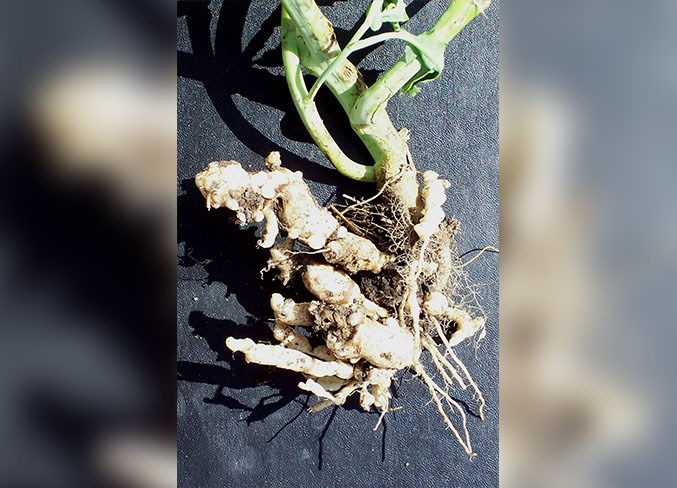Westlock County farmer John Guelly was patrolling his canola field back in 2013 when he came across a dead spot. Like any good farmer, he pulled up one of the plants to inspect it and saw its roots were infested with bloated, cancerous, club-like galls.
He called up agronomist Dan Orchard to identify the disease. As most Sturgeon County farmers have probably guessed by now, Orchard said he had clubroot.
“It felt like Dan was a doctor and he told me I had cancer,” said Guelly, speaking before some 200 people at the Edmonton Expo Centre last week.
And he’s not the only one who’s gotten that diagnosis. First spotted in canola in Alberta by Orchard and Sturgeon County farmer Walter Tappauf in 2003, clubroot is now widespread throughout Sturgeon and central Alberta and spreading to the south and northwest. This soil-borne pathogen causes club-like galls to grow on canola roots and can wipe out up to 80 per cent of a crop if left unchecked, Alberta Agriculture reports.
But many farmers still refuse to talk about it, said Guelly, who is also chair of the Alberta Canola Producers Commission.
“There’s a stigma around clubroot that’s really very similar to mental health discussions,” he said, in that no one wants to discuss it. But just like depression, clubroot is much easier to manage if you talk about it with your neighbours and agronomists.
“If you keep your clubroot discovery a secret and don’t tell anyone, it’s not going to help anyone, including yourself.”
Guelly and Orchard spoke about the importance of talking about clubroot last week at the 2019 FarmTech conference.
While pretty much everyone in Sturgeon County has it and talks about it, clubroot is still considered something to hide in other parts of Alberta, said Orchard, an agronomist with the Canola Council of Canada.
“The thing with clubroot is it’s associated with doing something wrong,” he said, like planting too much canola or not cleaning dirt off your equipment.
Many farmers feel they’ll lose land value if they have clubroot, but Guelly said his research in Westlock County suggests the disease does not affect land prices. Farmers might feel ashamed they have it, but truth is it can get on your farm through no fault of your own.
“The sooner you try and rectify the situation, the better person you are,” Guelly said.
Guelly and Orchard urged farmers to scout their fields frequently for clubroot by checking the roots of any suspect plants and doing regular soil tests. If they find a small patch, they should uproot and burn the infected plants and replant the area with grass.
“Scout, scout and scout some more,” Guelly said.
“Early detection of clubroot in your field is your best defence.”
Clean as much dirt off your equipment as possible before you move between fields to avoid spreading clubroot, Orchard said. While full sanitation is ideal, research suggests you can reduce your risk of spreading clubroot some 95 per cent just by chipping the big, visible clumps of dirt off your gear.
Guelly urged farmers to only plant clubroot-resistant varieties of canola. He’d tried 10 of them over the years and found them no less productive than regular canola.
Orchard said research suggests clubroot can adapt to a resistant strain in as little as three plantings, so it’s important to rotate your use of them. He also recommended putting at least two years between canola crops in any one field, as the longer you go between plantings, the longer your resistant variety will last.
Just as Bell has a Let’s Talk day for mental health, Guelly said Alberta should have a similar day for clubroot.
“We need people to talk about the disease so we can figure out how to properly control it,” he said.




